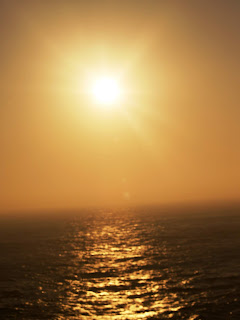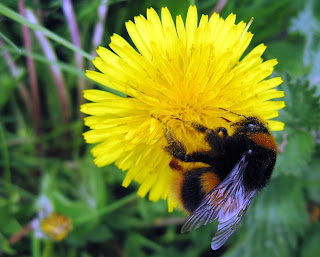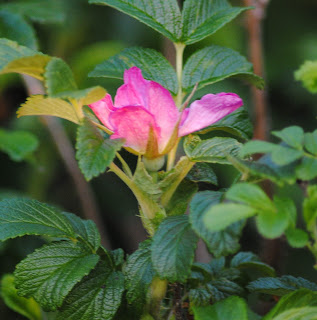Researchers at the Weizmann Institute in Israel, have established that people with severe brain injuries who respond to odours (such as fish and shampoo) have a better prognosis for returning to consciousness and living for at least a further 3 years than counterparts showing no sign of odour detection (https://www.theguardian.com/science/2020/apr/29/responding-to-smell-good-sign-in-unconscious-patients-scientists-find). The result is a simple and cheap test to evaluate the chances of recovery in people with minimal or no consciousness.
This blog may help people explore some of the 'hidden' issues involved in certain media treatments of environmental and scientific issues. Using personal digital images, it's also intended to emphasise seasonal (and other) changes in natural history of the Swansea (South Wales) area. The material should help participants in field-based modules and people generally interested in the natural world. The views are wholly those of the author.
Thursday, 30 April 2020
Swings and a Small (but Suggestive) Roundabout?
A modelling study has suggested that Europe has seen 11k fewer deaths attributable to air pollution over the Covid-19 lockdown (https://www.theguardian.com/environment/2020/apr/30/clean-air-in-europe-during-lockdown-leads-to-11000-fewer-deaths). Although this is only a fraction of the deaths (more than 200k) produced by the virus, one also should note that there have also been fewer people developing long-term respiratory illnesses (like asthma) so the health gains may well be higher. It would be a good move if this was remembered as we move out of lockdown. We should try to improve health as a matter of course.
Wednesday, 29 April 2020
University Sufferage?
Covid-19 is exerting enormous financial and operational challenges on all UK Universities (https://www.theguardian.com/education/2020/apr/25/degrees-of-separation-can-universities-adapt-in-the-rush-to-online-learning). The most immediate impact has been the urgent need to migrate most of the teaching from lecture theatres, tutorial groups and Laboratories to electronic equivalents involving 'Zoom' and other platforms (it will be interesting to see what we return to at the end of lockdown). Additional academic problems are raised for examinations (as unseen, invigilated papers no longer fit the bill) and independent quality control by external examiners talking directly to candidates becomes problematic. In addition, although one can develop and utilise 'virtual' practical and fieldwork sessions, I do not feel that they deliver precisely the same skill sets to participating students. The research aspect of the role of universities also has challenges, especially in terms of team work and using people as subjects in studies. You can add to this the loss of the social development aspect of student life with the closures of bars, eating facilities, sports venues et cetera. The UK Universities are also likely to take a major hit by the 'disappearance' of an estimated quarter of a million of overseas students (and their fees). The constructed accommodation blocks will also fail to bring in the calculated finances from both students and conferences. The University sector has been a major earner for UK plc, it will be interesting to see whether it (or some of it) can weather the storm.
Microplastics Impair the Estate Agent Drive in Hermit Crabs
It has now been demonstrated that human-generated microplastics (in cosmetics, in washing machine waste, even in tea bags and also generated by erosion of larger plastic waste) impair the abilities of Hermit crabs to choose an optimal residence (https://www.theguardian.com/environment/2020/apr/29/microplastics-disrupt-hermit-crabs-ability-to-choose-shell-study-suggests). These soft-bodied crabs generally utilise vacated gastropod mollusc shells for protection and, of course, they have to adjust the size of the selected shell to the size of their own bodies (some will even fight other hermits for a preferred residence). Culturing them in tanks with microplastic-laced seawater (now almost ubiquitous in our oceans), impairs their ability to choose the most suitable shell. This will challenge the survival of these species.
Tuesday, 28 April 2020
Plantasia
There have been attempts before to encourage plants to glow in the dark. This involved introducing bacterial genes, carrying luciferins, to create bioluminescence but this process was generally toxic to the plants. A new technology has been now described in which genes from a bioluminescent fungus are introduced to plants (https://www.theguardian.com/science/2020/apr/27/scientists-create-glowing-plants-using-mushroom-genes). These are tolerated by the plant as they act upon naturally-occurring caffeic acid in their hosts. The intention is, not only to produce weirdly glowing house plants as a novelty, but to trace some naturally-occurring processes in the plants per se. Leaves generally show a reduction in light emission as they age, whereas its intensity increases when they are munched upon by herbivores. The greatest degree of bioluminescence appears to come from flowers.
Hot: Pants
Yet another reminder that we (and our planet) won't be in a good place even after (or, perhaps, if) we emerge from the Covid-19 lockdown. In spite of the reduced emissions of 'greenhouse gases', resulting from the greatly reduced economic activity over this period, meteorologists reckon there is a very strong probability that 2020 will be the hottest year since records were taken (https://www.theguardian.com/environment/2020/apr/27/meteorologists-say-2020-on-course-to-be-hottest-year-since-records-began). You need really sustained reductions in emissions to get any meaningful change to runaway climate change. I bet, however, that all the mood music will suggest we press on the accelerator!
Monday, 27 April 2020
Fracked Out
It has been suggested that the Covid-19 -related fall in oil usage (and price) will result in bankruptcies of fracking (shale gas extraction) companies in the USA (https://www.theguardian.com/business/2020/apr/25/fracking-america-boom-founders-prices-demand-collapse-covid-19). The activity had been in a boom phase, briefly making that country a producer of more oil than either Russia or Saudi Arabia. Although things may well turn around relatively quickly, fracking may not return to its former levels in the US and the whole rationale of building a pipeline from Canada's tar sands to the Gulf of Mexico is thrown into doubt. As a side issue, the development of a fracking industry in the UK (already highly contentious) seems even less viable.
It Works for Some
It is gratifying to read that conservation efforts (in terms of directing money and time) for endangered Mammalian species by relatively rich populations can improve the numbers of those aided by almost 50% (https://www.theguardian.com/environment/2020/apr/23/conservation-plans-help-boost-threatened-mammals-scientists-find?). Having said that, there are relatively few Mammalian species and almost everyone likes most of them (a little bit). It becomes more problematical for species lower down the food chain as they are much more numerous and some are positively disliked by substantial numbers of the human population. Only a few of the prettier ones get conservation support.
Sunday, 26 April 2020
Other Things to Worry About?
There are people (happy souls?) who are paid to assess the risks to the survival of our species (https://www.theguardian.com/science/2020/apr/26/what-if-covid-19-isnt-our-biggest-threat). The question was posed 'What if Covid-19 isn't our biggest threat?' One such risk specialist noted that, as a species, we are pretty poor at responding to challenges to our species survival, except when we can see it happening (we are excellent at putting off doing anything positive, prior to that point). So, perhaps Covid-19 has come at a pretty good time in reminding us, without being too lethal for the species, of the dangers of pandemics in our highly-interconnected world? Sadly, the expert appears to believe that nuclear war and global warming are bigger threats to our species survival. So, what are the odds on our species surviving the next 100 years? He reckons we have a 1 in 6 chance of following the Dodo (i.e. the same odds as Russian roulette).
Storks to Bring Their Own Babies?
It has been reported that at least 3 pairs of European white storks have constructed nests of twigs in oak trees on the Knepp estate in West Sussex in a conservation programme (https://www.theguardian.com/environment/2020/apr/26/uk-first-wild-stork-chicks-hatch-centuries). Eggs have been laid and it is hoped that the first chicks to hatch for centuries in this country will emerge. One must caution, however, that eggs were laid last year but they did not hatch.
Saturday, 25 April 2020
Masked Avengers?
The clear advice from the WHO and other bodies is that wearing a non-surgical face mask will not protect you from being infected with Covid-19. Having said that, in many countries, the wearing of these coverings, in public, is seen in a substantial proportion of the population. So why do they do it and why do the authorities encourage (or even insist upon) it? There is an interesting (and I find convincing) opinion piece (https://www.theguardian.com/commentisfree/2020/apr/24/face-masks-mandatory-spread-coronavirus-government), making the case that the benefits are more for other people. The virus is passed on by droplets being released into the air, obviously in coughing and sneezing, but probably also in general talking and simply breathing. The mask (or other face coverings) can reduce this spread, limiting transmission of the pandemic. This is especially important because it is clearly evident that some people may contract the infection but be asymptomatic (but probably capable of passing on the virus). This is likely to be very important in locations (like the UK) where most people have not yet been tested for the virus. The author suggests that the UK's advice on face masks is illogical. The government's main concerns appear to be that 1.Wearing a face mask might make people show more risky behaviour (unproven but possible); 2. It reduces the supply of masks to vulnerable care workers (it's not that kind of mask!) and 3. No double blind, control studies on the benefits of mask wearing have been carried out (true but neither have approved strategies, like 'social distancing', been subjected to that degree of scientific rigour). I personally feel that simple face mask wearing would at least be helpful (like 'social distancing') in limiting the spread o the virus.
Friday, 24 April 2020
Thursday, 23 April 2020
Inundated!
A study has claimed that, although some 72 million people where globally endangered by flooding in 2010, the number will rise to some 147 million by 2030 (https://www.theguardian.com/environment/2020/apr/23/flooding-double-number-people-worldwide-2030). This doubling can be directly linked to climate change and will influence populations living by rivers and in coastal regions. As well as the direct risk to life, flooding is very destructive in terms of its effects on buildings, transport, food production and disease control. Of course, in other parts of the globe, people might well experience shortages of water (climate change involves major disturbances of weather patterns).
Flying Away?
Worrying news that global insect numbers are reportedly down some 25% on figures recorded in 1990 (https://www.theguardian.com/environment/2020/apr/23/insect-numbers-down-25-since-1990-global-study-finds). This is certainly the case in Europe where insects are important as pollinators, recyclers and elements in food chains. It does appear that humans (especially in agriculture) are the primary cause of this decline.
Seeing the Changes 1422
More flowers between Loughor and Penclacwydd with Silverweed (Potentilla anserina); Black medick (Medicago lupulina); Changing forgetmenot (Myosotis discolour); Germander speedwell (Veronica chamaedrys) and Cultivated apple (Malus domestica) all in bloom. In Penclacwydd, young Lackey moth (Malacosoma neustria) larvae sunned themselves on their web.
Wednesday, 22 April 2020
Krill Kill?
Researchers at the University of Tasmania have identified micro-particles of plastic in an ice core taken from Antarctica in 2009 (https://www.theguardian.com/world/2020/apr/22/microplastics-found-for-first-time-in-antarctic-ice-where-krill-source-food). The core is from a region where krill crustaceans feed and, their feeding technique, suggests that the plastics will be ingested. Many organisms, such as the mighty baleen whales, filter feed on the krill, so it is highly likely that the plastics will influence entire food chains. It would be interesting to determine whether the concentration of micro-plastics is increasing in more recent ice samples.
Sniffing Out Trouble
The exquisite sense of smell in dogs has been used to detect illegal drugs, explosives and even cancers in people. There is now a suggestion that these animals can be trained to identify someone with a Covid-19 infection (https://www.independent.co.uk/news/uk/home-news/coronavirus-uk-sniffer-dogs-lshtm-cases-symptoms-covid-19-a9477981.html). Training in such cases, generally takes only several weeks and some dogs have greater affinity for detection. If it prove possible (not at all unlikely), the dogs could be used at airports and ferry terminals as well as doing rapid preliminary screening of people prior to more traditional clinical tests. The dogs do not appear to get the virus themselves.
Tuesday, 21 April 2020
True Blood?
It is certainly worth doing trials (underway in both the UK and the USA) to establish whether transfusing serum from people, who have recovered from a Covid-19 infection, can help people struggling in hospital with the disease (https://www.theguardian.com/society/2020/apr/20/uk-trial-coronavirus-treatments-using-blood-from-survivors). This is a long-established approach (depending on boosting the antibodies to the virus) and was reportedly trialled in the early stages of the pandemic in China with anecdotal success. The difficulty, of course, is that it would be ethically difficult to do a fully-controlled double-blind study in which some seriously ill patients received plasma from people who had not had the disease (and the physicians were initially unaware which serum had been given to which patient). We will have to rely on the percentages of recovery compared to groups receiving no transfusions. It will be difficult to ensure that the experimental and the 'control' groups are well-matched in other respects (in terms of age, gender, ethnicity, severity of disease and levels of medical and nursing care). I suspect that very large groups will be needed.
Plastics Plus
If we are going to take recycling seriously, it may be time to help the recyclers by removing 'hybrids' from the chain (https://www.theguardian.com/environment/2020/apr/20/plastic-products-recyclers-single-use). These are items, such as singing birthday cards, which look to be made from cardboard but obviously contain cheap electronics and toxic batteries. They are difficult to identify and difficult to dispose of effectively.
Monday, 20 April 2020
Gender Danger?
It seems that men are almost twice as likely to die from a Covid-19 infection than are women. The reasons for this are, however, currently obscure (https://www.theguardian.com/world/2020/mar/26/men-are-much-more-likely-to-die-from-coronavirus-but-why). One of the first suggestions, from the Chinese outbreak, was that it was related to the levels of cigarette smoking (much higher in males than females in that country). But the male death bias persists in other countries where the levels of smoking in men and women are not so different. Another suggestion relates to behavioural differences between the genders, with males being less likely to wash their hands or to seek timely medical help than their female counterparts. More recently, attempts have been made to implicate biological factors such as the impact of sex hormones on the immune system or even an effect of the 'X' chromosome (with men obviously only having one, whereas females have 2). Whatever way you cut it, the dice appear to be stacked against males in this pandemic.
Driving Up Covid-19 Deaths?
A German study, using data from France, Germany, Italy and Spain, has revealed that nearly 80% of Covid-19 deaths occur in the regions where the nitrogen dioxide levels in the air are highest (https://www.theguardian.com/environment/2020/apr/20/air-pollution-may-be-key-contributor-to-covid-19-deaths-study). This pollutant is mainly produced by vehicles with diesel engines. This is yet another indicator of the dangers of living, being taught or working in locations with high levels of air pollution. Levels have, of course, generally declined as a consequence of traffic being reduced by lockdowns but we do need to strive to stop them rebounding as economic activity returns.
They Don't Need Aftershave!
A report from Japan suggests that male Ring-tailed lemurs used wrist 'pheromones' to attract females (https://www.theguardian.com/uk-news/2020/apr/16/fruity-and-irresistible-male-lemurs-wrist-scent-seduces-the-girls). The odour appears very effective but I think it is a little premature to call it a pheromone (that implies it is a single chemical compound and is entirely unique to this species).
Deck the Swabs!
There is a somewhat disturbing tale from the UK's Milton Keynes Covid-19 testing centre that appears to have lots of capacity waiting expectantly but only a relatively few swabs to test each day (https://www.theguardian.com/commentisfree/2020/apr/16/swab-tester-uk-germany-south-korea). Testing and tracking are advocated as effective ways of helping to deal with the pandemic (as revealed in the recent experiences of Germany and South Korea) but the UK's problem seems to be rooted in the collection of samples in sufficient numbers and transporting them safely to the centres. The results also need to be gathered, returned swiftly and acted upon if there is to be any point to the process.
Sunday, 19 April 2020
Boom Time Rats
Indigenous birds are being threatened in New Zealand because the Covid-19 lockdown is reportedly largely stopping all pest control (https://www.theguardian.com/environment/2020/apr/18/boom-time-for-new-zealands-rats-as-lockdown-gives-them-free-rein-in-cities-aoe). The pests are the usual introduced eutherian mammals (rats, mice and stoats), all of which will take birds (especially chicks) and eggs. Things are especially problematical as this was already set to be a boom year for pests because of last year's seed production (giving the reproduction of mice and rats fuel to burn).Rats and mice are real dangers for many island populations of birds, especially those species that are ground nesting. A lot of bird conservation in some areas comes down to rat catching.
Seeing the Changes 1418
Fool's parsley (Aethusa cyanpium) was blooming in Loughor. In Bynea, Bird'sfoot trefoil (Lotus corniculatus) had started to appear. In Penclacwydd, Heath speedwell (Veronica officinalis) was in flower and Orange tip butterflies (Anthocharis cardamines) mated on Cuckoo flower whilst another male waited.
Saturday, 18 April 2020
Subscribe to:
Comments (Atom)
-
I n the UK and US, a pparently popular and successful vegan/vegetarian restaurants are reportedly closing or adding meat to their menus ( ...
-
Early ripening fruit may seem convenient but some folk think it confirms environmental stress. There's also a possibility th...





















































%20mating%20NWCW.jpg)

